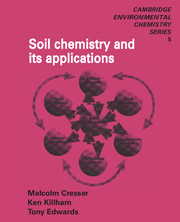5 - Soil fertility
Published online by Cambridge University Press: 05 August 2012
Summary
What is soil fertility?
The term ‘soil fertility’ is difficult to define precisely. Generally it describes an overall soil condition which is the combined product of various natural processes and management options. A ‘fertile soil’ is one which is capable of producing a desired crop with favourable yield and quality characteristics. Large areas of the world still suffer from severe restrictions to agricultural productivity as a result of soil chemical, physical and/or biological limitations. The example of excessive salt build up has been mentioned previously (Chapter 4). It has been suggested that approximately 35% of the world's irrigated land suffers from suboptimal productivity (Carter, 1982).
For any production system to be sustainable, nutrient inputs and outputs must be balanced over a reasonable timescale. The nutritional requirements of individual plant species vary considerably and therefore the fertility of a soil varies for individual plant species (Brown & Jones, 1977). Removal of nutrient elements with the harvested crop is a major potential cause of decline in soil fertility, and losses should therefore be replenished. Typical values for the amounts of major nutrients removed by a range of crops are shown in Table 5.1. While in the present context chemical aspects of fertility are of prime concern, it is difficult to separate these from the closely linked physical and biological processes.
Natural levels of fertility are seldom adequate to sustain a reasonable long-term degree of agricultural productivity.
- Type
- Chapter
- Information
- Soil Chemistry and its Applications , pp. 100 - 127Publisher: Cambridge University PressPrint publication year: 1993

